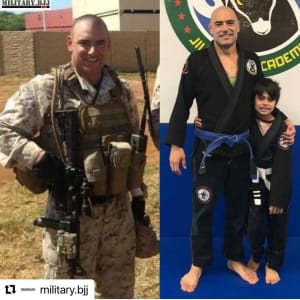
The Benefits of Brazilian Jiu-Jitsu for PTSD and Stress Relief
For decades, the martial arts world has recognized the effectiveness of training Brazilian Jiu-Jitsu for managing stress and anxiety. And in 2017, what BJJ practitioners knew intuitively was backed up by scientific research.
BJJ purple belt Özdemir Kizilkan conducted a study in Istanbul that compared the stress levels of individuals who practiced Brazilian Jiu-Jitsu to those who maintained a more sedentary lifestyle. The study found that those who practiced Jiu-Jitsu were both less affected by the stress of daily life and better able to cope with the stress that did come their way. According to the study, the control that’s learned when training Jiu-Jitsu translates into a strong sense of control of the rest of one’s life and instills the confidence necessary to handle personal problems that arise day to day.
Jiu-Jitsu for PTSD
Jiu-jitsu’s effectiveness for managing stress and anxiety doesn’t translate just to the low-level stresses of everyday life, though. For years, military veterans have been using Brazilian Jiu-Jitsu as a powerful treatment for post-traumatic stress disorder.
In the United States, an average of 20 veterans die everyday from PTSD-induced suicide, and the divorce rate among veterans is around 90 percent! Black-belt Chad Robichaux, head coach at the Gracie Barra Jiu-Jitsu Gym in Magnolia, Texas, who is himself a veteran with his own PTSD struggles, focuses specifically on training veterans. Over the course of two years, Robichaux says that 1500 veterans graduated from his program—with zero suicides and zero divorces. That’s a 100 percent success rate!
While an obvious reason for PTSD in veterans is the witnessing of traumatic events in combat—many veterans return from combat with a sense of survivor’s guilt after having lost friends in combat—it’s not the only reason. PTSD can also be caused by the return to civilian life, the loss of daily structure and regular physical activity that military life necessitates, the lost sense of mission and shared purpose that comes with serving with others, and even boredom. Soldiers are trained to be hyper-alert and constantly aware, and with combat comes the benefit of regular adrenaline rushes that satisfy this alertness. After the return to civilian life, many veterans maintain this hyper-vigilance without ever experiencing real danger that leads to adrenaline release and relief of tension, and this lack of relief can cause depression.
Brazilian Jiu-Jitsu can address all these causes. Maintaining a regular Jiu-Jitsu training schedule reintroduces structure into one’s life. Additionally, practitioners develop a strong bond with their fellow athletes; every time the athlete steps on the mat, he’s working with a team to hone his skills and build discipline. Students rely on one another to push each other forward and to work harder. In time, Jiu-Jitsu can become a mission; diet, daily routine, and supplemental exercise—an athlete begins to consider all these factors within the context of improving their Jiu-Jitsu.
Finally, Jiu-Jitsu is intense physical training. Essentially, it’s about simulating the threat of death or severe injury with every roll—and learning to act accordingly. Jiu-Jitsu demands presence and mindfulness. There’s no room for thinking about the stresses of life.
All of this is why, at Connection Rio, we do more than train, we live Jiu-Jitsu.
